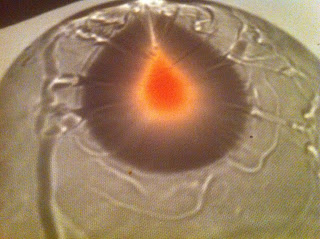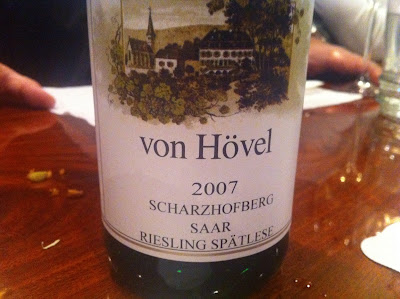At a recent dinner with several Houston-area wine bloggers, an interesting aphorism came up: Every palate matters. Does that hold when it comes to opinions about wine? As with almost anything, the answer is somewhere in the middle, but overall the notion that every wine drinker's palate matters is a valuable concept.
 |
| What wines go off in your head like a light bulb? |
The easiest way to understand that is to concede that we live in the information age -- or at least during an epoch in which information, its volume, and its accessibility are of central importance to our society. Indeed, the very notion that more-is-better when it comes to information seems to be hardening into theorem. Setting aside the need to sort through various degrees of how reliable that information is, there is undeniably something appealing about the information economy. You can crystallize this in a way easily understood during this election season: we like polls because they let us know with a reasonable certainty what likely would happen were voting to take place on any given day. The more data a poll has, in theory, the more accurate it is. And the same is true for this information society. Dump everything into a central input -- the Internet, broadly speaking -- and you're going to get an increasingly accurate read on things the more good information you include.
Obviously, the paragraph above is an over-simplification. As acknowledged, it doesn't account for bad or blatantly misleading or false information. (One might argue the Internet excels at the blatantly false.) But drilling down on this idea a bit further reveals that it is useful. We like to rely on experts in this country; you might argue we're obsessed with doing so -- in politics, when it comes to advice on parenting, in litigation, in almost every life situation you'll find an expert telling you what to do. What you don't often get, however, is a meaningful glimpse of the raw data that lie behind the opinion. And that's where the pure-democracy free-for-all of the Internet is such fun and holds so much potential.
 |
| Large-format bottles at Charlie Trotter's in Chicago. |
To bring the focus back to wine, you can readily see how the proliferation of information enhances and frames expert opinions. Many wine consumers are familiar with the 100-point-scale of ratings employed by Robert Parker's Wine Advocate and the Wine Spectator. And a portion of those consumers are lashing back against the "tyranny" of slapping a purportedly objective number on wine, a beverage lauded for its nuance and singularity of expression. Of course it's silly to think that anything as subjective as wine could be reduced to a number. It's also silly to think that an "expert" taster's opinion, such as that of Robert Parker or James Laube or James Suckling, should be given dictatorial deference. Each of them is, however skilled, just one taster. And it is the Internet and the ease with which it allows information proliferation that has enabled consumers to make terrific inroads against this tyranny of experts in the wine industry.
The best example of this CellarTracker, Eric Levine's invaluable web-based wine software. (Though it is worth noting that bulletin boards such as Wine Berserkers -- although not Parker's miserable online forum -- are also worthy venues.) Apart from being an intuitive and comprehensive tool for managing your wine cellar, CellarTracker allows user to post public tasting notes, and it has become the single finest repository of data on individual wines in the world. It also tethers in various expert reviews -- either automatically, in the case of the International Wine Cellar, Burghound, and others -- or via manual input for Parker and Spectator.
 |
| Riesling at Lotus of Siam in Las Vegas is one of life's pure pleasures. |
To understand why this is part of CellarTracker's genius, you have to understand generally why wine tasting notes matter. Rarely do two wine drinkers' palates mesh perfectly, if at all. As a result, when you read a tasting note, you have to calibrate your own palate to that of the writer. One person's "black cherry" might be another person's "blackberry." One person's perception of sweetness or tannin might differ dramatically from that of another. When widely available tasting notes were relegated to a handful of critics, it was difficult to calibrate your palate to that of a critic (not to mention the lingering fear that disagreeing with a critic's expert assessment might make you "wrong") because drinking a wine and comparing it to a single, fleeting tasting note is perversely inexact. Believe it or not, critics like Robert Parker get wines wrong; they have off days; they don't like certain wines or styles. These are biases inherent in every wine drinker, so the margin for error with fewer voices in the tasting note chorus is much greater.
CellarTracker, however, provides more data points for wine drinkers than ever before and, as a result, makes this "palate calibration" easier because the amount of data significantly reduces the prospects that information about the wine will be an outlier. (Naturally, when CellarTracker has fewer data on a wine, the less reliable it is.) The net result is that wine drinkers win because there is a more transparent, democratic community. Expansive forums like CellarTracker also enhance the usefulness of professional critics by giving them greater context -- it's easier to see when they get wines wrong or how they compare to someone whose palate coincides more closely with yours. This helps break down a lot of the old snobbery that has intimidated people from appreciating wine and have remained obstacles for too long. And, yes, it also means that every palate matters.


